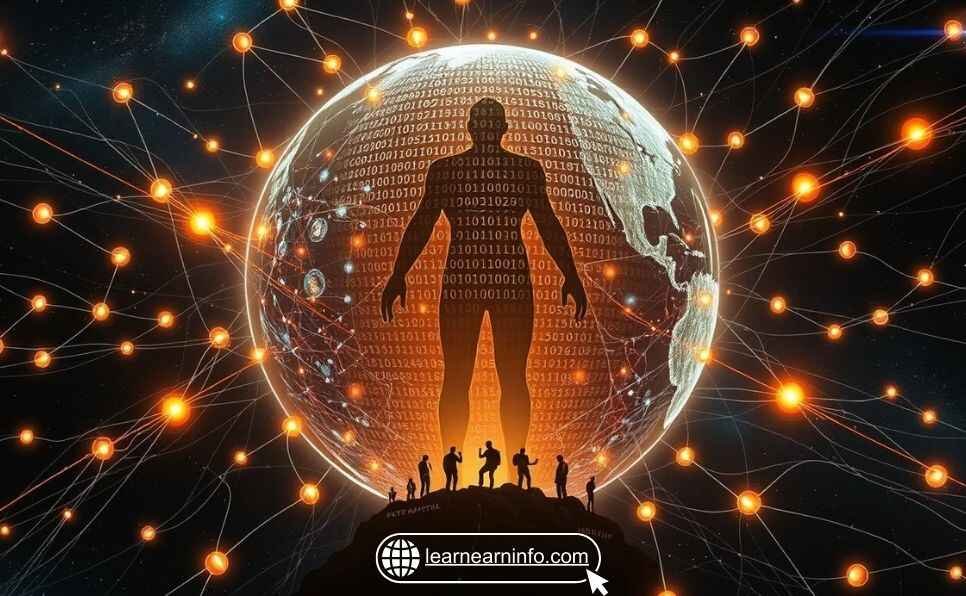Table of Contents
- Introduction
- Importance of Internet in Daily Life
- The Myth of a Decentralized Internet
- Key Takeaways
- Summary of Internet Control and Its Implications
- The Giants Behind Internet Infrastructure
- Cloud Service Providers and Their Market Dominance
- Global Data Center Distribution
- Network Infrastructure Ownership
- Big Tech Companies and Internet Control
- Dominance of Google, Facebook, Amazon, and Apple
- Implications for Online Speech and Digital Rights
- The Role of Content Delivery Networks (CDNs)
- Impact on Internet Traffic
- Security Concerns with CDN Centralization
- Internet Service Providers (ISPs)
- Network Management and Access Control
- Balancing Security and Internet Freedom
- Digital Rights and Internet Governance
- International Regulations and Privacy Policies
- The Debate on Internet Freedom and Cybersecurity
- Future Challenges and Opportunities
- Risks of Internet Centralization
- Strategies for Preserving Internet Openness
- Conclusion
- The Need for Balanced Governance and Digital Rights
- FAQ Section
Introduction
Who Controls 40% of the Internet? The Answer May Shock You.
The internet is a big part of our lives today. Tim Berners-Lee, who made the World Wide Web, said it’s for everyone. But, the truth is different. One big tech company controls 40% of the internet.
This fact makes us wonder: who are these giants behind the internet? They control cloud services, data centers, and networks. Knowing who they are helps us understand our digital future.
Key Takeaways
- A single tech company controls 40% of global internet traffic, challenging the notion of a decentralized and democratic internet.
- The internet’s infrastructure is dominated by a few major players, including cloud service providers, data center operators, and network infrastructure owners.
- The concentration of power in the hands of these tech giants raises concerns about internet regulation, data privacy, and the future of online freedom.
- Content delivery networks (CDNs) further solidify the control of major tech companies over internet traffic and content distribution.
- Internet service providers play a significant role in managing network access and potentially influencing internet governance.
The Hidden Giants Behind Internet Infrastructure
The internet we use every day is not just run by big tech names. Cloud service providers and network companies are key players. They shape our online world, from how we see websites to keeping our data safe.
Cloud Service Providers and Their Market Share
Cloud computing is dominated by Google Cloud, Microsoft Azure, and Amazon Web Services (AWS). They control 60% of the global cloud infrastructure market. Their big data centers help us use many online services, like cloud storage and AI apps.
Data Center Distribution Worldwide
Data centers are the heart of the internet. They are found all over the world. The United States, China, and Germany have the most data centers. Where these centers are located affects the internet, from security to how fast things load.
Network Infrastructure Ownership
Network providers own the cables and devices that carry our data. Verizon, AT&T, and Comcast are key in this area. They control how we access the internet and its quality.
Knowing who runs the internet’s backbone is important. It helps us understand internet infrastructure, cybersecurity, internet regulations, and ISP management. Their work is crucial for the digital world’s future.
Controls Internet: Major Tech Companies and Their Dominance
In today’s world, a few big tech companies rule the internet. They shape our online world and control internet governance, online speech regulations, and digital rights. Their choices affect internet restrictions and our online freedom.
The “Big Tech” giants like Google, Facebook, Amazon, and Apple are at the top. They have lots of user data. This lets them show us ads and pick what we see online. They control search, social media, shopping, and cloud services.
| Tech Company | Dominant Sector | Market Share |
| Search Engine | 92.47% | |
| Social Media | 68.63% | |
| Amazon | E-commerce | 39.8% |
| Apple | Mobile Devices | 47.5% |
These big companies can change what we see online and how we act. This makes some people worry about digital rights and internet freedom. As they grow, we need strong internet governance to keep the internet fair and open.
The big tech companies’ power changes the internet’s future. We must watch and act to protect internet governance, online speech regulations, and digital rights. This is important for the internet’s future.
The Rise of Content Delivery Networks (CDNs)
The internet has changed a lot because of Content Delivery Networks (CDNs). These systems of servers make digital content reach users faster and safer. They make the internet better.
How CDNs Shape Internet Traffic
CDNs place servers near users. This cuts down on wait time for web pages and videos. It makes the internet feel faster.
They also help firewalls and internet protocols handle traffic better. This makes the internet work smoother.
Security Implications of CDN Concentration
More people are using a few big CDNs. This makes the internet vulnerable. If these CDNs get hacked, a lot of websites could be in trouble.
Impact on Global Content Distribution
CDNs have changed how we share digital content. They make it easier to get information from anywhere. The world is now more interconnected as a result.
“CDNs are now the foundation of the contemporary internet, guaranteeing that consumers anywhere may access material in an effective and safe manner.
Internet Service Providers and Network Management
Internet Service Providers (ISPs) play a big role today. They manage the network that carries most of our online traffic. This affects how we use the internet every day.
ISPs help keep us safe by using access controls and online safety tools. They block bad websites and watch for threats. But, this makes some people worry about freedom and privacy.
| Key Responsibility | Potential Challenges |
| Providing robust access controls | Balancing security and internet freedom |
| Implementing content filtering | Preventing overreach and censorship |
| Monitoring network activity | Protecting user privacy and data rights |
The internet is always changing. ISPs must find a good balance between safety and freedom. They need to make sure everyone can use the internet safely and openly.
Digital Rights and Internet Governance
In today’s world, the internet’s rules are complex. Network protocols and internet standards keep changing. Digital rights and internet security are now key topics.
This section looks at global internet rules, privacy, and debates on data control. It also talks about the future of internet freedom.
International Internet Regulations
The internet goes beyond country borders. Making global rules is hard but important. Groups like ICANN and ITU help set these rules.
They work to keep the internet safe and working well everywhere.
Privacy Concerns and Data Control
Privacy and data control are big issues now. Cloud services and social media collect a lot of our data. This raises questions about how our info is used.
Places like the European Union have made laws to protect our privacy. They want to give us more control over our online lives.
Future of Internet Freedom
The future of the internet is a big debate. Governments, tech companies, and groups like ours all have opinions. There’s worry about more censorship and surveillance.
Some say the internet should be free for all. Others think we need more rules to fight cybercrime and stop fake news.
“The internet is the most powerful tool we have for creating a more just and equitable world. But it is also a tool that can be abused to cause great harm. The future of the internet depends on how we choose to govern it.”
– The World Wide Web was created by Tim Berners-Lee.
Conclusion
A few big tech companies control the internet’s basics. This control affects how we see the internet. It impacts censorship, privacy, and who gets to decide the internet’s rules.
Cloud providers and data centers shape the internet. Content delivery networks also play a big role. It’s important for us to know who’s in charge and fight for freedom online.
We need new laws and teamwork to keep the internet open. Knowing about censorship and privacy helps us fight for a free internet. Together, we can make sure the internet stays a place of freedom and new ideas.
FAQ
What percentage of the global internet traffic is controlled by a single tech giant?
One tech giant controls about 40% of the world’s internet traffic.
What are the major cloud service providers and their market share?
The big players in cloud services are Amazon Web Services (33%), Microsoft Azure (20%), and Google Cloud (10%). Others also play a role.
How are data centers distributed worldwide?
Data centers are found all over the world. They are most common in the U.S., Europe, and Asia-Pacific.
Which companies own the majority of the internet’s network infrastructure?
A few big companies own most of the internet’s network. These consist of Level 3 Communications, Comcast, Verizon, and AT&T.
How do major tech companies influence content moderation and user experiences online?
Big tech companies like Google, Facebook, and Twitter control what we see online. They decide what content is allowed. This can be a problem for digital rights and internet freedom.
What is the role of Content Delivery Networks (CDNs) in shaping internet traffic?
CDNs, like Cloudflare and Akamai, are key in making the internet work. They help content reach us faster. But, they can also affect how well the internet works and what we can access.
How do Internet Service Providers (ISPs) manage network traffic and implement access controls?
ISPs can watch, filter, and control what we see online. This can keep us safe but also limit what we can do on the internet. It’s a big issue for internet freedom.
What are the key international regulations and policies governing the internet?
The internet is ruled by many international rules and groups. One is ICANN, the Internet Corporation for Assigned Names and Numbers. They handle important things like domain names and IP addresses.
What are the main privacy concerns and data control issues related to the internet?
Tech companies and ISPs collect a lot of our data. This has raised big privacy worries. People are fighting for more control over their data and online rights.

















